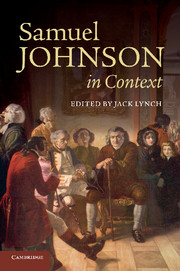Book contents
- Frontmatter
- Contents
- Illustrations
- Contributors
- Preface
- Chronology
- Abbreviations
- Part I Life and works
- Part II Critical fortunes
- Part III Contexts
- Chapter 10 America
- Chapter 11 Anglicanism
- Chapter 12 Anthropology
- Chapter 13 Authorship
- Chapter 14 Biography
- Chapter 15 Book trade
- Chapter 16 Clubs
- Chapter 17 Conversation
- Chapter 18 Dictionaries
- Chapter 19 Domestic life
- Chapter 20 Education
- Chapter 21 Empire
- Chapter 22 Essays
- Chapter 23 Fiction
- Chapter 24 History
- Chapter 25 Journalism
- Chapter 26 Law
- Chapter 27 Literary criticism
- Chapter 28 London
- Chapter 29 Medicine
- Chapter 30 Mental health
- Chapter 31 Money
- Chapter 32 Nationalism
- Chapter 33 Philosophy
- Chapter 34 Poetry
- Chapter 35 Politics
- Chapter 36 Scholarship
- Chapter 37 Science and technology
- Chapter 38 Scotland
- Chapter 39 Sermons
- Chapter 40 Shakespeare
- Chapter 41 Slavery and abolition
- Chapter 42 Social hierarchy
- Chapter 43 Theatre
- Chapter 44 Travel
- Chapter 45 Visual arts
- Chapter 46 War
- Chapter 47 Women writers
- Further reading
- Index
- References
Chapter 44 - Travel
from Part III - Contexts
Published online by Cambridge University Press: 05 June 2012
- Frontmatter
- Contents
- Illustrations
- Contributors
- Preface
- Chronology
- Abbreviations
- Part I Life and works
- Part II Critical fortunes
- Part III Contexts
- Chapter 10 America
- Chapter 11 Anglicanism
- Chapter 12 Anthropology
- Chapter 13 Authorship
- Chapter 14 Biography
- Chapter 15 Book trade
- Chapter 16 Clubs
- Chapter 17 Conversation
- Chapter 18 Dictionaries
- Chapter 19 Domestic life
- Chapter 20 Education
- Chapter 21 Empire
- Chapter 22 Essays
- Chapter 23 Fiction
- Chapter 24 History
- Chapter 25 Journalism
- Chapter 26 Law
- Chapter 27 Literary criticism
- Chapter 28 London
- Chapter 29 Medicine
- Chapter 30 Mental health
- Chapter 31 Money
- Chapter 32 Nationalism
- Chapter 33 Philosophy
- Chapter 34 Poetry
- Chapter 35 Politics
- Chapter 36 Scholarship
- Chapter 37 Science and technology
- Chapter 38 Scotland
- Chapter 39 Sermons
- Chapter 40 Shakespeare
- Chapter 41 Slavery and abolition
- Chapter 42 Social hierarchy
- Chapter 43 Theatre
- Chapter 44 Travel
- Chapter 45 Visual arts
- Chapter 46 War
- Chapter 47 Women writers
- Further reading
- Index
- References
Summary
To TRA′VEL. v.n. [This word is generally supposed originally the same with travail, and to differ only as particular from general: in some writers the word is written alike in all its senses; but it is more convenient to write travail for labour, and travel for journey.]
1. To make journeys: it is used for sea as well as land, though sometimes we distinguish it from voyage, a word appropriated to the sea.
Fain wou’d I travel to some foreign shore,
So might I to myself myself restore. Dryden.
In 1725, the novelist, poet, and playwright Mary Davys declared that the novel was dead. “’Tis now for some time, that those Sort of Writings call’d Novels have been a great deal out of Use and Fashion,” she observed, “and that the Ladies (for whose Service they were chiefly design’d) have been taken up with Amusements of more Use and Improvement; I mean History and Travels.” Davys’s assertion that “Novels” and “Travels” are distinct kinds belies their actual overlap in the 1720s. Jonathan Swift satirized the gullible readers of travel books in Travels into Several Remote Nations of the World, by Lemuel Gulliver (1726), and travel would remain a staple structural device of the eighteenth-century novel. Many eighteenth-century authors whom we now classify as novelists – including Henry Fielding, Tobias Smollett, Laurence Sterne, and Ann Radcliffe – also published accounts of their travels.
But Davys was right that “Travels” – by which she meant travel books – were wildly popular. “Travels” constituted a major category of the British book trade from the first century of printing, and travel writing had an impact on almost every other genre of writing and area of knowledge. Thousands of individual accounts were published, and the seventeenth century saw a proliferation of collections. By the eighteenth century, travel books were so numerous as to need their own bibliography: in 1704, the brothers Awnsham and John Churchill published a Collection of Voyages and Travels (1704), which includes a lengthy “Catalogue of most Books of Travels” in English, Latin, Italian, Spanish, and French. The category of “travel writing,” as distinct from “Books of Travels,” encompasses an even broader variety of forms, from personal correspondence to official reports.
- Type
- Chapter
- Information
- Samuel Johnson in Context , pp. 375 - 384Publisher: Cambridge University PressPrint publication year: 2011
References
- 1
- Cited by



